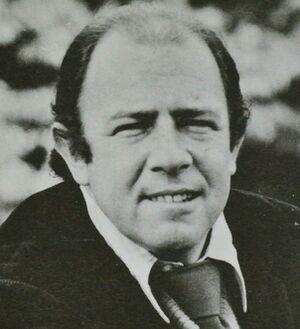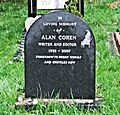Alan Coren facts for kids
Quick facts for kids
Alan Coren
|
|
|---|---|
 |
|
| Born | 27 June 1938 |
| Died | 18 October 2007 (aged 69) |
| Resting place | Hampstead Cemetery |
| Education | Wadham College, Oxford (BA) Yale University University of California, Berkeley |
| Occupation | Humourist, writer, journalist |
| Spouse(s) |
Anne Kasriel
(m. 1963) |
| Children |
|
| Relatives | Michael Coren (cousin) |
Alan Coren (born 27 June 1938 – died 18 October 2007) was a famous English writer and humourist. He was known for his funny articles and witty comments. Alan Coren was a regular guest on the BBC radio show The News Quiz. He was also a team captain on the BBC television show Call My Bluff. For many years, he was the editor of Punch magazine, which was very popular.
Contents
Early Life and Education
Alan Coren was born in 1938 in East Barnet, England. His father, Samuel Coren, was a builder and plumber. His mother, Martha, was a hairdresser. His children later described his father as someone who did many different jobs.
Alan went to Osidge Primary School and then East Barnet Grammar School. He was a very bright student and won a scholarship to study English at Wadham College, Oxford, a famous university. He earned a first-class degree in 1960. Later, he received a special scholarship called the Harkness Fellowship. This allowed him to study modern American literature at Yale University and the University of California, Berkeley in the United States. He studied for a PhD but decided not to finish it.
Career as a Writer and Journalist
After university, Alan Coren thought about becoming a professor. But he chose to become a writer and journalist instead. He started by selling articles to Punch magazine. Soon, they offered him a full-time job. He also wrote for The New Yorker magazine.
Magazine Editorships
In 1966, Alan Coren became the literary editor at Punch. This meant he was in charge of the magazine's books and literature section. In 1969, he became the deputy editor. Then, in 1977, he became the main editor of Punch magazine. He stayed in this important role until 1987.
After leaving Punch, Alan Coren became the editor of The Listener magazine. He worked there from 1987 to 1989.
Newspaper Columns
Alan Coren wrote many columns for different newspapers. From 1971 to 1978, he wrote about television for The Times newspaper.
He also wrote funny columns for the Daily Mail from 1972 to 1976. He contributed to The Observer and Tatler too.
From 1984, he was a television critic for The Mail on Sunday. Later, he moved to the Sunday Express as a humorous columnist. In 1989, he started writing a column for The Times again. He continued writing for The Times for the rest of his life.
Broadcasting Work
Alan Coren also had a successful career in radio and television. In 1977, he became a regular guest on BBC Radio 4's new funny quiz show, The News Quiz. He was on this show until the year he passed away.
From 1996 to 2004, he was one of the two team captains on the popular UK game show Call My Bluff.
Books for All Ages
Alan Coren published about twenty books during his life. Many of these books were collections of his funny newspaper columns. Some of his well-known titles include Golfing for Cats and The Cricklewood Diet.
He also wrote a series of children's books called the Arthur series. These were published between 1976 and 1983.
One of his most famous books was The Collected Bulletins of Idi Amin. This book was a collection of his funny articles about the leader Idi Amin. An American journalist even found a copy of Coren's book on Idi Amin's bedside table!
Honours and Later Years
In 1973, Alan Coren was chosen to be the Rector of the University of St Andrews in Scotland. This is an important role, often held by famous people. He held this position until 1976.
In May 2006, Alan Coren became very ill after an insect bite led to a serious infection.
Death and Legacy
Alan Coren passed away from lung cancer in 2007 at his home in north London. He was buried at Hampstead Cemetery. He was survived by his wife, Anne, and their two children, Giles and Victoria. Both of his children also became successful journalists, following in their father's footsteps. His cousin, Michael Coren, who is also a journalist, said Alan helped him a lot.
After his death, an anthology (a collection of writings) of his work was published. It was called The Essential Alan Coren – Chocolate and Cuckoo Clocks. His children edited this book.
There is a short road in London named Alan Coren Close in his memory.
Images for kids
See Also
- Giles Coren
- Victoria Coren Mitchell
- The News Quiz
- Call My Bluff
- Punch (magazine)
 | Janet Taylor Pickett |
 | Synthia Saint James |
 | Howardena Pindell |
 | Faith Ringgold |


